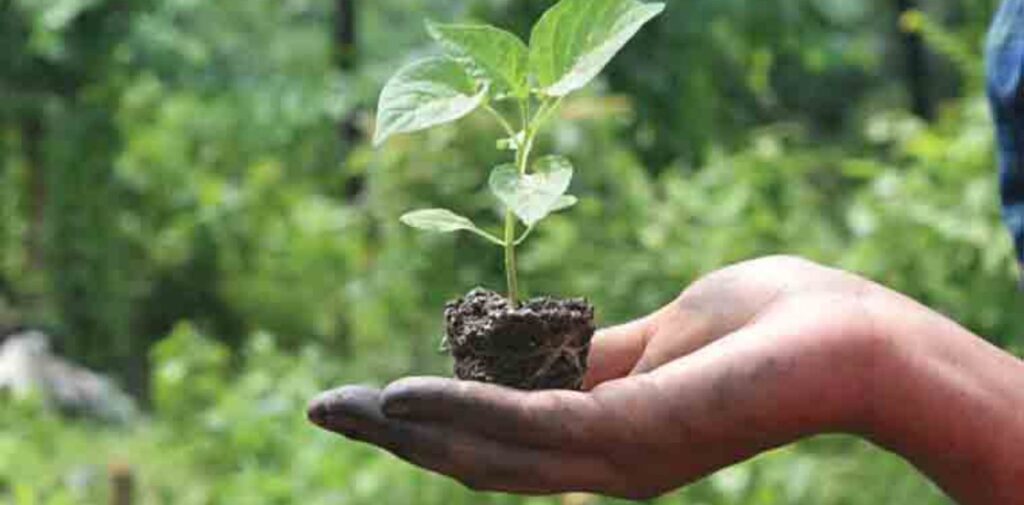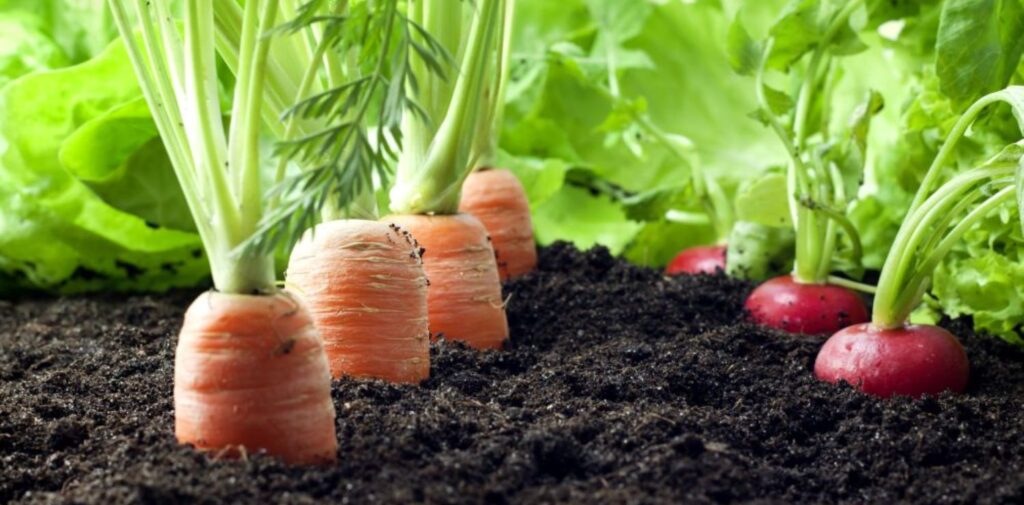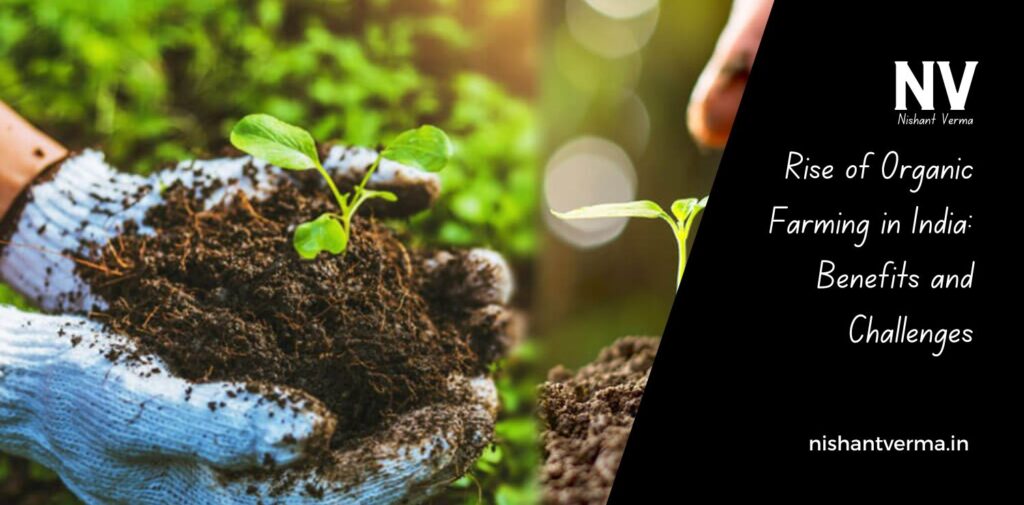In recent years, organic farming has become more popular in India. This is a good change because it helps the environment, improves health, and supports farmers in a better way. Organic farming means growing food without using chemicals like pesticides and fertilizers that can harm the soil, plants, and even people. Instead, organic farmers use natural ways to grow crops. In this article, we will learn about the rise of organic farming in India, its benefits, and the challenges farmers face while practicing it.

What Is Organic Farming?
Organic farming is a method of farming where crops are grown without using harmful chemicals like synthetic fertilizers, pesticides, or herbicides. Instead, farmers use natural methods to improve soil health and protect crops. For example, they may use compost (decayed plants and animal waste), natural pest control, and crop rotation (changing the crops grown in the same soil to keep the soil healthy).
Organic farming also focuses on preserving the environment by reducing pollution, conserving water, and encouraging biodiversity (the variety of plants and animals in the environment). Organic foods are grown in a way that is safer for both the planet and people.
The Rise of Organic Farming in India
India has a long history of farming, and for many years, farmers used traditional methods of growing crops. However, over time, as modern farming techniques were introduced, the use of chemical fertilizers and pesticides became widespread. This led to an increase in the use of chemicals in farming, which started harming the soil, water, and the health of people and animals.
In the last two decades, many people have started realizing the harmful effects of these chemicals. As a result, organic farming has been rising in India. More and more farmers are turning to organic farming practices because they see the long-term benefits. They want to grow healthy food, protect the environment, and make their farming more sustainable.
Benefits of Organic Farming
There are many benefits of organic farming, both for the environment and for the people who eat the food. Let’s look at some of the main benefits of organic farming in India:
- Healthier Food: One of the most important benefits of organic farming is that the food produced is healthier. Since organic farming avoids harmful chemicals, the food grown is free from pesticides and chemical fertilizers. This makes organic food safer to eat and better for your health. People who eat organic food have a lower risk of diseases caused by harmful chemicals, such as cancer or stomach problems.
- Better Soil Quality: In organic farming, the focus is on maintaining healthy soil. Organic farmers use methods like composting, crop rotation, and the use of green manure (plant material) to improve the soil. This helps keep the soil rich in nutrients and promotes better plant growth. Healthy soil also retains water better, which is important in areas with little rainfall.
- Environmental Protection: Organic farming is good for the environment because it avoids the use of chemicals that pollute the air, water, and soil. Chemicals from pesticides and fertilizers can run off into nearby rivers and lakes, polluting water sources. Organic farming helps protect water sources, prevents soil erosion, and encourages biodiversity. By promoting natural pest control and using organic fertilizers, organic farming reduces the negative impact on the environment.
- Supports Sustainable Farming: Sustainable farming means farming in a way that can be maintained for many years without damaging the environment or depleting resources. Organic farming is a form of sustainable farming because it avoids overuse of water and soil, and it does not rely on harmful chemicals. By using natural methods to grow crops, organic farming can continue for generations without damaging the land.
- Improved Farmer’s Income: While organic farming can be more expensive to start, it can help farmers earn a better income in the long run. Organic food is often sold at higher prices because consumers are willing to pay more for food that is healthier and grown without chemicals. Organic farmers can sell their crops in local markets, organic food stores, or even export them to other countries. This can provide farmers with a steady and profitable income.

Challenges Faced by Organic Farming
Despite the many benefits, organic farming in India also faces several challenges. These challenges make it difficult for some farmers to switch from traditional chemical-based farming to organic farming. Let’s look at some of the main challenges:
- High Initial Costs: Starting organic farming can be expensive. Organic seeds, natural fertilizers, and organic pest control methods can cost more than the chemicals used in traditional farming. Farmers also need to invest in training and knowledge to learn how to farm organically. This can be a barrier for small farmers who may not have enough money to make the switch to organic farming.
- Lack of Knowledge and Training: Many farmers in India are used to traditional farming methods, and they may not have the knowledge or training to adopt organic farming. There is a need for education and support to help farmers understand the benefits and techniques of organic farming. Without proper training, farmers might struggle to grow crops without chemicals and could face problems like pest attacks or poor yields.
- Pests and Diseases: In organic farming, farmers cannot use chemical pesticides to control pests. Instead, they have to rely on natural methods, such as using insect-repelling plants or introducing beneficial insects that eat harmful pests. However, pests can still be a big problem, and without effective pest control, crops may be damaged. Farmers need to be more creative and resourceful to manage pests and diseases naturally.
- Lower Yields in the Beginning: When switching to organic farming, farmers may experience lower yields (harvests) in the first few years. This happens because the soil needs time to recover and become rich in nutrients. Organic farming is a long-term investment, and the results may not be immediate. Farmers need patience and support to wait for their crops to grow properly.
- Market Access and Certification: Organic farmers need to get their crops certified as organic to sell them as organic food. This process can be expensive and time-consuming. Additionally, finding buyers for organic produce can be difficult in areas where people are not aware of the benefits of organic food. Organic farmers may also face competition from larger commercial farms that produce cheaper, non-organic food.

Government Support for Organic Farming
The Indian government has recognized the importance of organic farming and is supporting it through various programs. For example, the government has introduced schemes to provide financial assistance to organic farmers, promote organic certification, and create awareness about organic farming. The government also helps farmers connect with buyers and export markets, so they can sell their organic produce at a good price.
Several states in India, such as Sikkim, have made significant progress in promoting organic farming. Sikkim became the first state in India to be declared fully organic in 2016. This is a great example of how organic farming can be successful when there is strong government support and planning.
Conclusion
The rise of organic farming in India is an important and positive change. Organic farming offers many benefits, such as healthier food, better soil quality, environmental protection, and higher income for farmers. However, there are also challenges, including high initial costs, lack of training, and pest control issues. Despite these challenges, organic farming is growing in popularity, and many farmers are making the switch to this sustainable and eco-friendly way of farming.
With the right support from the government, education for farmers, and an increase in consumer awareness, organic farming in India can become more successful in the future. By supporting organic farming, India can create a healthier, more sustainable agricultural system for generations to come.




